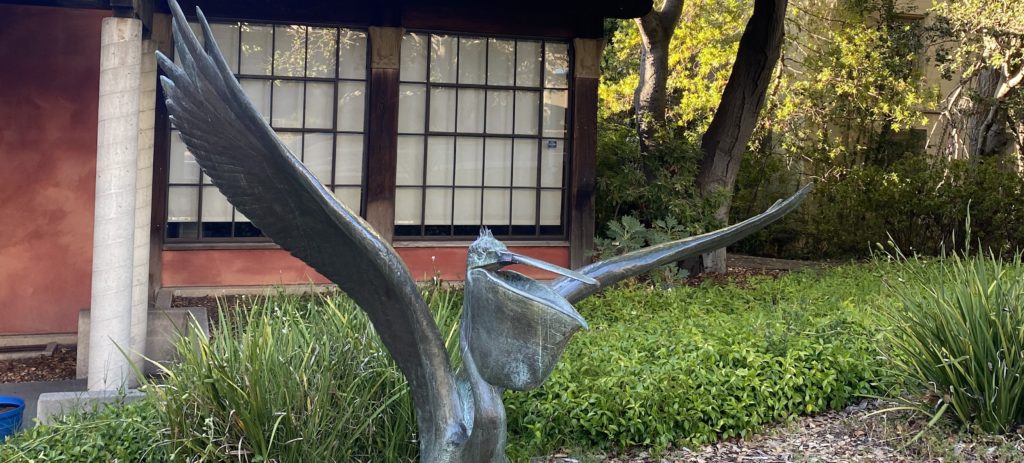There are cowboy poets, of course—so many that cowpoke poesy conferences, or “gatherings,” are held regularly in most of the western states. But while there are plenty of country and western song lyrics about truckers (“I got ten forward gears and a Sweet Georgia overdrive; I’m taking little white pills and my eyes are open wide”), trucker poets are a scarcer breed.
Arguably, the best and the brightest of this select group was Lowell Levant, a UC Berkeley undergrad who made a splash in Bay Area poetry circles in the 1960s. He published in the University of California’s literary magazine Occident, and was a featured reader in the 1965 Berkeley Poetry Conference. He was active in (and arrested during) the Free Speech Movement, and joined the Artists, Musicians, Poets and Sympathizers Local of the Industrial Workers of the World in San Francisco. Shortly thereafter, he abandoned academe, if not his passion for verse. Disenchanted with politics and not seeing many prospects for gainful employment in the couplet racket, he dropped out of Cal to drive long-haul rigs around the West.
Levant kept truckin’—and writing poetry—until he suffered a stroke in the summer of 2010. He died a few months later at the age of 65, leaving behind a small townhouse in the East Bay, furnished in a manner best described as Spartan. The melancholy job of disposing of his few personal effects went to his brother, University of Akron psychology professor Ronald Levant, a Berkeley grad who earned degrees in history and psychology in the 1960s.
“We were mainly concerned about preserving Lowell’s poems, but we couldn’t find them anywhere in the townhouse,” Levant recalls. “Finally, in a backyard shed, we found them—stuffed into several old grocery bags.”
Levant said his brother exemplified the tradition of the proletarian intellectual.
“(Essayist and longshoreman) Eric Hoffer was the most famous, but a large number of thinking, creative, working Bay Area people were part of that movement in the 1960s. Dropping out of Cal limited Lowell’s options, of course. If you’re a poet, your options are limited anyway, generally to an academic career. Without even an undergraduate degree, that wasn’t available to Lowell, so he turned to trucking. He drove all around the West Coast and the Southwest, and he really liked it. He liked the freedom, the machinery, the culture. He took pride in it.”
With the help of his family, Ron Levant reviewed and collated his brother’s poems. It was not an easy task. There were multiple versions of various poems, and many were untitled. Finally, the Levants culled a good selection from the pile of mildewed paper. Ron’s daughter, Caren Levant, contributed some poems of her own about her uncle. So did contemporaries of Lowell, poets Kenneth Irby, Will Staple, Doug Palmer and Gene Anderson.
The result is A Poet Drives a Truck: Poems by and about Lowell A. Levant, recently published by the University of Akron Press. A sample:
Winter Work
I grabbed the cold gas pump nozzles
in the morning fog
kneeled on shop rags to search
for the points on the frame
to prop the jacks on the lift
to flip the levers or
squeeze grease into zerts
till the boots popped.
One morning I thrived on gunk and messes
cleaned up the oil drain on the rollers
that leaked out the sides from being overfilled.
It made me not want to tell the beautiful stories
about going down into the belly of the earth.
Making gradual transitions, I buried the bent roots
of walnut trees in a valley field
and pulled out the marking stakes after they got planted.
Three days of hard work don’t drive me to desperate spend-thriftiness:
“A glass of whatever they’re drinking for everyone in the house.”
or other rash extravagance.
For Ron Levant, the book was both catharsis and memorial.
“Lowell and I had a complicated relationship,” he says. “We were very different. I was the older brother, I was the achiever. I had graduate degrees and a family, I was the university professor. He had dropped out of the university, and never married. I guess I hectored him at times. And he didn’t like me getting into his business, that’s for sure. But we were great buddies. We loved each, and my daughter was very close to him. It’s difficult, losing a sibling. You expect your parents will die at a certain point. But a brother, well, it’s harder. Working on this book was one way for me to deal with my grief.”
An event celebrating Lowell Levant’s work will be held on May 15th at Books Inc. at 1760 4th Street, Berkeley, with Lou Garcia, Will Staple, Doug Palmer and John Oliver Simon reading verse by and about the trucker poet.
When asked how Lowell would’ve responded to publication of the book, his brother laughs.
“He would’ve been pleased—no, amazed, floored. And he would’ve been ambivalent. I know he would have quibbled about the selections we included, and those we didn’t. He was a poet, after all.”



















